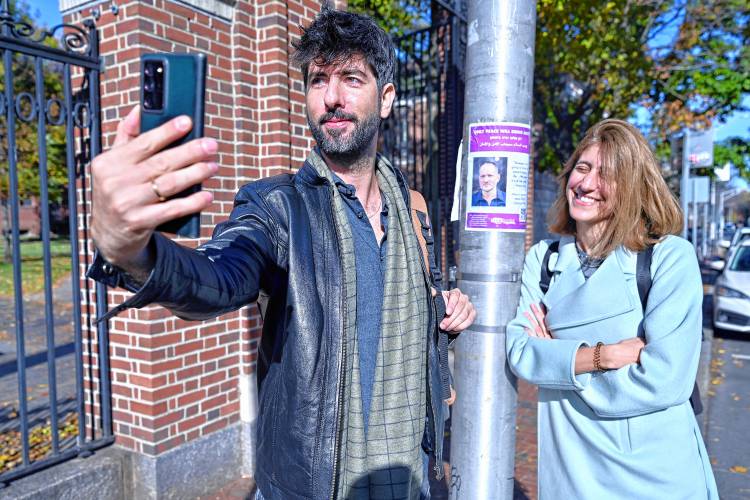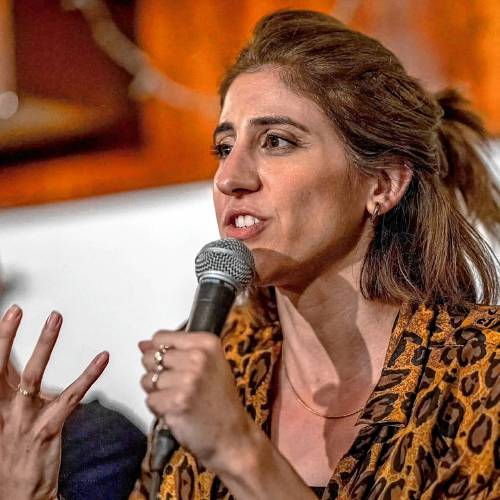Spreading message of coexistence: Palestinian, Jewish Israelis bring cause to UMass
|
Published: 03-07-2024 3:33 PM
Modified: 03-08-2024 1:45 PM |
AMHERST — In the face of the Israeli military’s destruction of Gaza and stepped-up settler violence in the West Bank, one grassroots group of Palestinian and Jewish Israelis is striving to provide an alternative to the government’s dominant narrative.
Speaking Wednesday to a packed Student Union ballroom at the University of Massachusetts, Sally Abed of Standing Together summarized the group’s message.
“One, no one is going anywhere. Two, Jewish safety is necessarily dependent on Palestinian freedom,” she said.
“Our goal is to be as loud as possible with the alternative, to put it on the menu.”
Her Standing Together colleague Alon-Lee Green said the first step is a cease-fire to stop the growing human catastrophe in Gaza, where 30,000 people, including 11,000 children, have died in five months of Israeli bombardment.
“This does not serve the safety of Israeli citizens,” Green said.
Israeli society was traumatized after the Hamas attack of Oct. 7, Abed said, and it resulted in a heavy crackdown, with Palestinians fired from their jobs and students expelled from universities.
“We all know someone who died or was kidnapped on Oct. 7,” Green said.
Article continues after...
Yesterday's Most Read Articles
Green, who began his career by organizing Israel’s first union of dining workers, and Abed talked about the importance of building political power.
Standing Together was founded in 2015, after the 2014 Gaza war, the deadliest war in Gaza up to that point, which was followed by a wave of violence in the West Bank and East Jerusalem.
One of Green’s formative experiences came out of his friendship with a Palestinian who took him to his family’s village in the West Bank. The Israeli government’s separation wall was built right through the village, he said, but any protests were met with violence from the Israeli military. The people had no rights.
“Not only do we need to end the war, we need to end the occupation,” Green said. “We must build power to change this reality.”
Abed, 32, said she had recently become the first Palestinian woman elected to the city council in her hometown of Haifa, in northern Israel. Palestinian citizens of Israel — about 20% of the total population — live a conditional existence, she said
“It’s not easy to create an equal partnership” of Arabs and Jews, she said. “But somehow we created spaces that truly feel like it can work.”
Asked about her vision of justice and freedom in Israel, Abed cited two things she saw as prerequisites.
“Palestinian sovereignty is necessary,” she said. “And an end to military control.”
Green said his involvement in Standing Together stemmed not just from a sense of solidarity with an oppressed minority.
“It’s my own self-interest,” he said. Under the present system, he explained, “We all lose, in different degrees.”
Besides the group’s efforts to support the people affected by settler terrorism in the West Bank, Standing Together mounts direct actions to challenge Israeli forces’ stranglehold on Gaza.
“Tomorrow, we organize a food and aid convoy from seven cities to Gaza,” Green said.
Their activism has not come without a cost.
“People tell us we’re traitors,” he said. “They threaten us.”
Members have had to leave their apartments and their offices because of the threats.
In response to an audience member’s question about how Israel is becoming a pariah nation and American Jews are feeling the effects, Green urged people to distinguish between the people and the government.
The Israeli government thinks it will have the support of Jewish people the world over, no matter what, but that support needs to be conditioned on its actions, Green said.
“Support the people, not the government,” he said.
Standing Together members began a speaking tour of the U.S. this week, lasting through April 8. Wednesday’s presentation was hosted by the Community, Democracy and Dialogue initiative at UMass, and was introduced and moderated by David Mednicoff, chair of the Judaic and Near Eastern studies department.
James Pentland can be reached at jpentland@gazettenet.com.



 Valley lawmakers seek shorter license for FirstLight hydropower projects
Valley lawmakers seek shorter license for FirstLight hydropower projects State Senate budget funds free community college for all
State Senate budget funds free community college for all ‘We can just be who we are’: Thousands show support for LGBTQ community at Hampshire Pride
‘We can just be who we are’: Thousands show support for LGBTQ community at Hampshire Pride Doors open at Tilton Library’s temporary home at South Deerfield Congregational Church
Doors open at Tilton Library’s temporary home at South Deerfield Congregational Church
